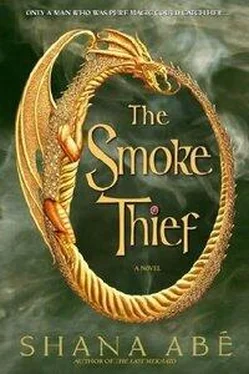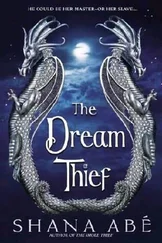But when a member of the family walked by, when they touched their hands to the walls, stroking fingers, the melody of the stones would fill them like nectar. The Tears of Ice was once again steeped in music that only the drákon could discern.
There was one stone that was not embedded in the walls. It was kept in a vault, in a pit, in a dungeon, left behind from the early days when that first wave of the drákon had fled the land. None of the Zaharen were allowed to touch it, although everyone in the family knew of its strength. It sang even from the bottom of the castle.
This diamond was called Draumr . Too powerful to be destroyed, too dangerous to look upon—because to look at it would be to ache for it—it was the only known fragment of earth with the potential to eclipse the family itself.
The Zaharen were, above all, strategists. They understood that the secret of this diamond was the secret of their undoing. It was forbidden even to speak its name.
Great wealth is certain to inspire great resentment, and the Zaharen were among the wealthiest families of the civilized world. It was fully believed that their treasures rivaled those of Rome herself, and that the pope fell into such envy upon his sole visit to the castle that he would not depart without a handful of cold, pure diamonds pressed upon him by the youngest maiden of the family.
She was a princess, lovely, brutally protected. Considered the living gem of the mountain, poems were recited in her name, flowers bloomed at her feet. Mortal men braved the winter passes just to glimpse her; when the pope touched her bare hand that morning, bending down to her from his mount, it was said he wept with joy.
Betrothed at birth, at the age of fifteen she was to wed a noble cousin. But on the eve of her marriage the princess was stolen from the castle. She was carried off to the slopes below, and with her the one thing in the world that could prevent her from escaping her abductor, that would keep her family from following.
Draumr.
The Zaharen began to fall into ruin.
The loss of the princess was a grievous blow; the lack of her recovery a worse one yet. The man who took her had wed her. There were children. There was tainted blood.
Yet when the Zaharen attempted to steal her back, to crush the mortal man who dared to defy them, they vanished utterly, one by one.
None of the Others could understand how.
This man was no one. He was a peasant, a laborer. But he had the princess and he had Draumr , and they were all he needed. Against knights and assassins, against fearsome beasts, the peasant began to pull apart the mightiest family the land had ever known.
Without the command of their drákon leaders, the armies dissolved into corruption and disarray. The prosperous cities began to empty of people.
Foreign princes smelled their weakness; new armies encroached. The borders of humankind crept closer and closer to Zaharen Yce . By the time the family realized they could no longer defend their castle or their lives, there were fewer than a dozen of them left.
And the half-blooded children far below, stunned under the spell of the dreaming diamond.
It was the princess who at last broke the spell. It was the princess who realized that her life was worth less than that of her kind, of her children, and so one night put a dagger into the peasant's heart and took the diamond that had enslaved her from his body.
For years, Draumr had sung in her head like a symphony. It had promised paradise, sweet dreams forever, and despite her resolve, she could not demolish it. Instead she crept away—far, far away—and with the diamond in her fist, she flung herself into the wet bowels of the earth.
The Carpathian Mountains are riddled with mines. Copper, gold, iron; their empty sleeves snake through bedrock and dirt.
She chose the deepest of the shafts. She made certain no one could ever follow.
Neither she nor anyone else realized that the true roots of the drákon had been divided centuries past, when the first of her people deserted the castle. She could not know that when she savored her last slow breath, that when she closed her eyes and took that slight, leaning step forward into black nothing, that she was merely a passage in the song of her kind, not the end note.
Because although the Zaharen had grown tainted and few, the other half of the drákon were green lands and an ocean away: secretly, savagely in bloom.
And their story was just beginning.
Chasen Manor
Darkfrith, England
1737
The Right Honourable Christoff René Ellery Langford, Earl of Chasen, was bored.
He had decided to demonstrate this fact by slouching in his chair, his legs outstretched and his blond head turned idly away from everyone else in his father's study. One sun-darkened cheek was propped languidly upon his fist; his green eyes were hooded, masked with brown lashes. He listened to his father talk with the haughty, brooding air common to either the young or the powerful.
Kit, as it happened, was both. Sixteen years old and well-acknowledged as the heir to the tribe, he endured these meetings as his duty. He did not speak. He did not bother to meet the eyes of the other men present. When he looked up from his boots he chose to contemplate the view from the Tudor windows, the summer lush hills and rich black trees. The beckoning woods.
He listened to the same debate the council had at every meeting now. He could practically predict, verbatim, who would say what.
“The safety of the tribe is paramount. We must ensure our survival.”
Parrish Grady again. The man never let up. Eldest member of the council, blue-eyed, sharp-toothed. Kit was beginning to consider him his own personal nemesis, if for no other reason than these meetings crawled on hours longer than they would without him.
Outside, just over a distant hill, appeared a flock of girls. About Kit's age, white skirts, frilled aprons, straw hats with ties that dangled in the wind. A few carried armfuls of flowers. He watched them come closer.
“Naturally, Parrish, our survival is paramount.” Kit's father, the marquess. “No one debates that.”
“We need a full-blood female!”
“I'd say we've been doin' our best there,” retorted Rufus Booke, brash and newly wed, “though mayhap you'd prefer to check our beds every night.”
Kit snorted back a laugh. He felt his father's gaze flick to him, then away.
“Aye, we need a female,” the Marquess of Langford agreed. “But we do not appear to have one. Yet. There are several young tribeswomen on the verge of the rebirth. We may hope one of them will complete the Turn.”
“Hope,” repeated Grady, derisive. “Four generations it's been, and no female to make the Turn! What will happen to us—all of us—when it becomes impossible for the menfolk as well?”
Silence greeted this. It was the great, simmering fear among the tribe, that the Gifts would be taken. That their powers would fade.
“We cannot force our fate,” said the marquess, harder now. “We all understand that. We are what we are. Our more immediate concern is the perimeter of the forest. There have been signs of recent disturbance, not our own. Strangers are prowling our lands. Christoff reported horse tracks up to Hawkshead Point.”
“Hawkshead? But that's not even ours! What the devil is the boy doing all the way out there? We have rules! He left the boundary!”
Again, the distinctive prickle of his father's gaze. Kit allowed himself the slightest curl of his lips.
“Let us focus on the matter at hand,” said the marquess smoothly. “Hawkshead is adjacent to our boundaries. If someone has chanced that far . . .”
Читать дальше












